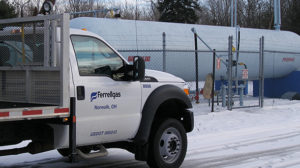Propane industry adjusts to COVID-19 effects
The coronavirus has taken a toll on industries across the world, but the propane industry continues to keep calm and carry on.

Photo by LP Gas Staff
The virus began affecting Americans at the end of January. By mid-March, it was declared a pandemic. In the midst of chaos, the propane industry – which is deemed an essential business – has addressed health concerns while still dutifully serving its customers. Here are five lessons from U.S. propane retailers on managing and adapting during the outbreak.
Communication is key
National propane retailer Ferrellgas is focused on keeping its customers and employees informed and up to date without causing panic.
“Communication has never been as vital as it is today, and it’s certainly ramped up at Ferrellgas,” says Scott Brockelmeyer, vice president of marketing and media relations.
The company closed most of its offices to the public and is utilizing social media, emails and its website to relay messages to customers in lieu of in-person interactions. Ferrellgas also hung signage on storefronts at its locations to indicate that the offices are closed and share the best ways to proceed with customers’ requests.
Use technology to reduce physical contact
In addition to using technology to communicate with clients, companies can curb person-to-person contact between delivery drivers and customers.
Ted Johnson Propane, located in Southern California, enabled voice control on the tablets that are used to capture customers’ signatures, allowing customers to speak their names into the tablet’s microphone to offer proof of delivery without physical contact.
“[We want] to avoid having 30 fingerprints on each tablet a day,” President Julie Johnson says. “Now, they don’t even need to hand the tablet to the customer. The customer never touches it.”
Prioritize essential deliveries
Pennsylvania retailer Koppy’s Propane addressed the coronavirus concerns by putting emergencies and deliveries to essential businesses at the top of its priority list. The company is accelerating deliveries a few weeks ahead of schedule, so customers can have peace of mind knowing they will receive their orders.
“We are looking at our customers from the standpoint of, ‘Is this a commercial customer? Is it an essential life-sustaining business?’ If it is, they’re going to the top of the list in terms of getting those deliveries made, making sure those customers are taken care of first and are kept full,” Vice President Kara Tucker says.
Employee and customer health comes first
Both Virginia’s Dixie Gas & Oil Corp. and Georgia’s Conger LP Gas understand that while propane is an essential business, abundant cautionary measures must be taken.
Both companies have given drivers sanitary materials, including face masks, extra gloves and hand sanitizer. Each company also advises its workers who enter customers’ homes to maintain a 6-ft. distance and check that both parties feel healthy and comfortable. If one party feels at risk of getting sick, it can reschedule for a future date.
“In our industry, we just can’t go home and forget about it until it gets better,” says Chris Earhart, president of Dixie Gas & Oil Corp. “We are part of the essential infrastructure of the country [and need] to be able to deal with it.”
No such thing as overprepared
While companies are adjusting to new ways of conducting business, there is opportunity to use this time to prepare for future potential crises.
Paraco Gas in New York has demonstrated the benefit of preparedness in the time of a pandemic. Over a year ago, the company initiated a crisis communication plan, in which employees were trained on how to conduct business during an unprecedented time. Employees learned how to work from home and handle an influx of customer inquiries, which made the transition during recent weeks smoother.
“We believe it’s better to be over-prepared and then not need to implement everything that you prepared, versus waiting too long and being unable to serve your employees, customers and communities,” Executive Vice President Christina Armentano says.
















